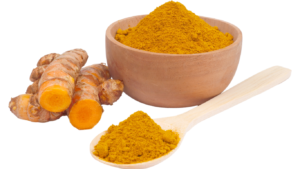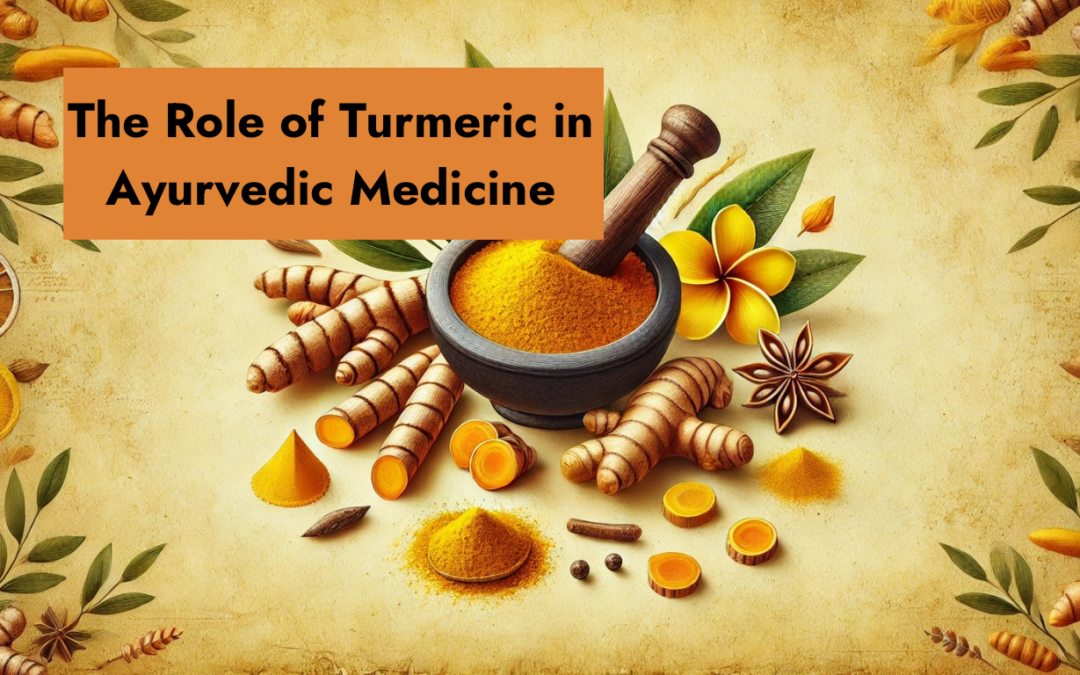Turmeric, scientifically known as Curcuma longa, is one of the most celebrated herbs in Ayurveda, the ancient Indian system of medicine. Known as “Haldi” in Hindi and often referred to as the “golden spice,” turmeric has been a cornerstone in Ayurvedic practices for thousands of years.
Its vibrant yellow hue and potent medicinal properties make it a versatile ingredient in health and healing.
In this blog, we’ll explore the role of turmeric in Ayurvedic medicine, its traditional uses, and its significance in promoting holistic well-being.
The Ayurvedic Perspective on Turmeric
Energetic Properties
In Ayurveda, every herb is characterized by its taste (rasa), energy (virya), and post-digestive effect (vipaka). Turmeric holds the following properties:
- Rasa (Taste): Bitter and pungent
- Virya (Energy): Heating
- Vipaka (Post-digestive Effect): Pungent
Turmeric is considered tridoshic, meaning it can balance all three doshas (Vata, Pitta, and Kapha) when used appropriately.
However, its heating nature makes it particularly effective in balancing Kapha and Vata doshas, while its bitterness helps detoxify and balance Pitta.
You can also read: The different types of turmeric
Traditional Uses in Ayurveda

1. Detoxification and Cleansing

Turmeric is renowned for its ability to purify the blood and promote liver health. It supports the body’s natural detoxification processes by:
- Stimulating bile production in the liver.
- Helping to eliminate toxins from the bloodstream.
This makes it an integral part of Ayurvedic cleanses and detox regimens.
2. Anti-inflammatory Properties

One of turmeric’s primary bioactive compounds, curcumin, is a powerful anti-inflammatory agent. Ayurveda uses turmeric to treat conditions like:
- Joint pain and arthritis (Sandhivata).
- Skin inflammation and allergies.
- Digestive disorders caused by inflammation.
3. Digestive Health

Turmeric is a digestive stimulant that promotes healthy metabolism and appetite. It:
- Reduces bloating and gas (Agnimandya).
- Helps with indigestion and acid reflux (Amlapitta).
- Strengthens the gut lining and supports microbiome balance.
4. Wound Healing and Skin Care

The antiseptic and antibacterial properties of turmeric make it a go-to remedy for skin issues. It is used in Ayurveda for:
- Healing cuts, wounds, and burns.
- Treating acne, eczema, and other skin conditions.
- Enhancing skin tone and reducing pigmentation.
Many Ayurvedic beauty rituals include turmeric masks for glowing skin.
5. Immunity Booster

Turmeric enhances the body’s defense mechanisms by:
- Strengthening the immune system.
- Fighting infections, colds, and coughs.
- Acting as a natural antibiotic and antiviral agent.
6. Mental and Emotional Health

Turmeric’s ability to balance the doshas extends to mental health. It is used to:
- Reduce anxiety and depression by improving mood and enhancing brain function.
- Promote better sleep and alleviate stress.
Modern Research Supporting Ayurvedic Claims
Modern science has validated many of the traditional uses of turmeric. Studies show that curcumin, the active compound in turmeric, has:
Antioxidant Properties: Protects cells from oxidative damage.
Anti-cancer Potential: Helps in preventing and managing certain types of cancers.
Heart Health Benefits: Lowers cholesterol and prevents arterial plaque buildup.
Neuroprotective Effects: Reduces the risk of neurodegenerative diseases like Alzheimer’s.
These findings highlight turmeric’s wide-ranging benefits and reaffirm its place in Ayurvedic medicine.
How to Use Turmeric in Ayurvedic Medicine
1. Blood Purification and Detoxification
- Usage: Turmeric is considered a potent rakta shodhaka (blood purifier).
- Benefits: It cleanses the blood of toxins, improves circulation, and enhances liver function.
- Application: Often consumed with milk or warm water to aid in internal detoxification.
2. Digestive Health
- Usage: Turmeric supports digestion and strengthens agni (digestive fire).
- Benefits:
- Relieves indigestion, bloating, and gas (Agnimandya).
- Helps manage acidity and stomach ulcers (Amlapitta).
- Stimulates bile secretion for better fat metabolism.
- Application: Mixed with ginger or black pepper for enhanced absorption.
3. Joint and Muscle Health
- Usage: As a natural anti-inflammatory, turmeric alleviates pain and swelling in joints and muscles.
- Benefits:
- Used for treating arthritis (Sandhivata) and muscular injuries.
- Reduces stiffness and enhances mobility.
- Application:
- Consumed as a decoction or paste.
- Applied externally as a poultice mixed with mustard oil or water.
4. Skin Care and Wound Healing
- Usage: Known for its antiseptic, antibacterial, and anti-inflammatory properties, turmeric is used extensively for skin health.
- Benefits:
- Promotes wound healing and prevents infections.
- Treats acne, rashes, and eczema.
- Reduces scars, pigmentation, and signs of aging.
- Application: Applied as a paste with water, honey, or sandalwood powder on the affected areas.
5. Respiratory Health
- Usage: Turmeric is effective in treating respiratory disorders such as colds, coughs, and asthma.
- Benefits:
- Acts as an expectorant and clears phlegm (Kapha imbalance).
- Relieves throat infections and reduces congestion.
- Application:
- Consumed with warm milk or honey.
- Inhaled as steam with turmeric-infused water.
6. Immune Boosting
- Usage: Turmeric enhances overall immunity and protects the body from infections.
- Benefits:
- Strengthens ojas (vital energy) for better immunity.
- Combats viral and bacterial infections naturally.
- Application: Often taken as golden milk (Haldi Doodh) with a pinch of black pepper to maximize absorption.
7. Managing Diabetes
- Usage: Turmeric helps regulate blood sugar levels and improves insulin sensitivity.
- Benefits:
- Reduces excess sugar in the blood (Madhumeha).
- Protects against diabetic complications like neuropathy and inflammation.
- Application: Mixed with neem or amla powder for added efficacy.
8. Mental and Emotional Well-being
- Usage: Turmeric is used to calm the mind and support mental clarity.
- Benefits:
- Alleviates symptoms of anxiety, depression, and stress.
- Enhances memory and focus (Medhya Rasayana).
- Application: Consumed as part of Ayurvedic formulations or teas to support emotional health.
9. Reproductive Health
- Usage: Turmeric is used to support both male and female reproductive health.
- Benefits:
- Regulates menstrual cycles and alleviates menstrual pain (Kashtartava).
- Acts as a uterine tonic and supports postpartum recovery.
- Application: Consumed with jaggery or as part of herbal formulations.
10. Enhancing Longevity and Vitality
- Usage: Turmeric is regarded as a Rasayana (rejuvenative herb) in Ayurveda.
- Benefits:
- Slows down aging by reducing oxidative stress.
- Improves energy levels, vitality, and resilience.
- Application: Consumed daily in small amounts for long-term health benefits.
How to Use Turmeric in Daily Life
- Golden Milk (Turmeric Latte): A warm blend of milk, turmeric, ginger, and black pepper is a soothing beverage for immunity and inflammation.
- Turmeric Paste: Combine turmeric with water to make a paste for topical application on wounds or skin.
- Turmeric Tea: Brew turmeric with ginger and lemon for a digestive and detoxifying tea.
- Cooking: Add turmeric to curries, soups, and stews for flavor and health benefits.
- Capsules or Supplements: For those who find it challenging to consume turmeric in food, curcumin supplements are an effective alternative.
Precautions and Contraindications
While turmeric is generally safe, Ayurveda advises caution in certain cases:
- Excess Heating: Overuse can aggravate Pitta dosha, leading to heat-related issues like acidity or skin rashes.
- Pregnancy: Turmeric in large quantities may stimulate the uterus and should be consumed in moderation.
- Gallbladder Issues: People with gallstones or bile duct obstruction should consult a healthcare provider before using turmeric.
Conclusion
Turmeric’s role in Ayurvedic medicine is a testament to its enduring value as a healing herb. Its ability to balance the body, mind, and spirit aligns perfectly with Ayurveda’s holistic approach to health. Whether incorporated into food, skincare, or wellness routines, turmeric remains a golden key to vibrant living.
Embracing this ancient spice can help modern individuals reconnect with nature’s wisdom and lead healthier, more balanced lives.

